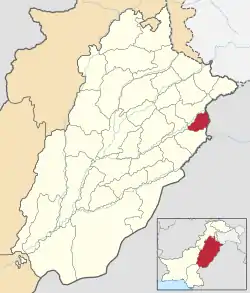September 2010 Lahore bombings
The September 2010 Lahore bombings were a series of three suicide bombings which occurred on 1 September 2010, in Lahore, Pakistan.[2][3] Thirty-eight were killed and more than 250 were injured when a Shia procession was targeted.[4][5]
| September 2010 Lahore bombings | |
|---|---|
 The location of Lahore in Pakistan. | |
| Location | Lahore, Punjab, Pakistan |
| Date | 1 September 2010 |
Attack type | Suicide bombings |
| Weapons | suicide belts |
| Deaths | 38 [1] |
| Injured | 250 |
| Perpetrators | Lashkar-e-Jhangvi Tehreek-e-Taliban Pakistan |
| Motive | Anti-Shi'ism |
Background
Pakistan which has a mostly Sunni population has seen sectarian attacks against minorities including Shias who account for about 20% of Pakistan's population. It is estimated that 4000 people have been killed in religious violence over the last decade.[6] This was the third attack against Lahore's minority communities in 2010: in May two mosques were attacked belonging to the Ahmadiyya Muslim Community, and in July the Sufi community came under attack. While the government of Pakistan has banned several militant groups many of them have re emerged under different names and critics say that governments reluctance to act against them is encouraging them.[7]
These were the first major attacks in Pakistan since the country was devastated by 2010 Pakistan floods.[6]
Attacks
The blasts targeted a procession by about 35,000 Shia to mark the death anniversary of Ali whom they consider to be their first Imam.[3] The three blasts occurred within 2,000 feet (610 m) of each other.[8] The first explosion happened in the Karbala Gamay Shah area at 6:50 pm local time. This was followed by a second explosion about 25 minutes later in Bhati chowk. The third blast happened in Anarkali Bazaar about 10 minutes after the second explosion.[5] Bodies of three suicide bombers have been recovered according to government sources.[3] Two days later the death toll rose to 38.
Responsibility
Lashkar-e-Jhangvi claimed responsibility for the bombings.[9]
Aftermath
After the blasts angry mobs attacked police stations and burnt vehicles leading to deployment of Pakistan Rangers to maintain law and order.[5] After the attack the authorities urged people not to hold outdoor religious meetings.[7]
Reaction
Three days of mourning was ordered by the provincial government and all private and public institutions were closed.[5] The attacks were condemned by Prime Minister Yousaf Raza Gillani who vowed to bring the perpetrators to justice.[3] The Chief Minister of Punjab Shahbaz Sharif announced compensation of Rs 500,000 for those killed and Rs 75,000 for the injured.[10]
Following another attack in Quetta 2 days later, Interior Minister Rehman Malik told the press that militants want to fan the flames of sectarianism in an effort to destabilise the government followinga series of military offensives against them. He also claimed that Punjabi, such as Lashkar-e-Jhangvi, and al-Qaida and the Tehrik-e-Taliban are one and the same.[11]
See also
References
- http://www.thaindian.com/newsportal/south-asia/toll-in-lahore-bombings-rises-to-38_100421988.html
- Gillani, Waqar (1 September 2010). "Suicide Bombers in Pakistan Kill Dozens of Shiites". The New York Times. Retrieved 2 September 2010.
- "Triple bomb blasts hit Lahore Shia procession". BBC. 1 September 2010. Retrieved 1 September 2010.
- "Multiple blasts in Lahore; 35 killed, 250 injured". NDTV. Retrieved 2 September 2010.
- "Blasts lead to protest in Lahore, troops deployed to control situation". Xinhua News Agency. 1 September 2010. Retrieved 1 September 2010.
- Hussain, Waqar (1 September 2010). "Suicide blasts in Lahore kill 25, injure 180". Agence France-Presse. Retrieved 1 September 2010.
- "Pakistani Officials Caution Against Large Outdoor Religious Ceremonies". Voice of America. 2 September 2010. Retrieved 2 September 2010.
- "Blasts rock Lahore; at least 28 dead". CNN. 2 September 2010. Retrieved 1 September 2010.
- "Lahore triple blasts leave 29 dead, over 200 injured". The News International. 1 September 2010. Retrieved 1 September 2010.
- "Triple terror blasts in Lahore leave 27 dead". Dawn. 2 September 2010. Retrieved 2 September 2010.
- http://www.voanews.com/english/news/Pakistani-Flooding-to-Affect-Fight-Against-Militants-102218169.html
External links
- In pictures: Blasts hit Shia procession in Pakistan, BBC, 2010-09-01